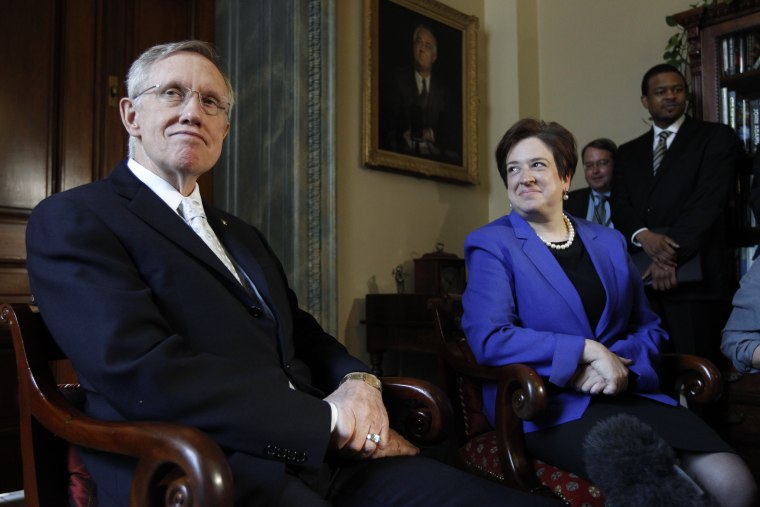Supreme Court nominee Elena Kagan defended herself Wednesday against Republican charges she's not fit to be a justice as she met for the first time with senators who hold the key to her confirmation.
Publicly mum as she made the rounds on Capitol Hill, Kagan sought during a series of private meetings to beat back GOP suggestions that she'd be a liberal rubber stamp for President Obama, who named her Monday to succeed retiring Justice John Paul Stevens.
"She's been politically active throughout her life, she's identified with the American liberal position, she clerked for two activist judges," said Sen. Jeff Sessions of Alabama, the top Republican on the Judiciary panel that will hold hearings on Kagan's nomination.
Sessions said he asked Kagan during a lengthy meeting whether she understood she might be called upon as a justice to issue rulings that might disappoint her "fans and supporters." The 50-year-old solicitor general responded "that she would be faithful to the law, but of course every nominee says that," Sessions said. "Some of our most activist judges have said that."
The exchange came on a day when senators in both parties promised a fair confirmation process for Kagan, and Senate Majority Leader Harry Reid, D-Nev., pledged as he welcomed her to the Capitol to make it "as smooth as possible." Barring a surprise, Kagan is likely to be confirmed this summer by a Senate where Democrats have more than enough votes to prevail and Republicans are showing little appetite for a Supreme Court showdown.
Hot-button legal issues
Still, the debate is virtually certain to become a forum for the two parties to battle over the direction of the court and hot-button legal issues from abortion to political speech.
Sen. Mitch McConnell of Kentucky, the Republican leader, said before visiting with her that Kagan must prove that her current post on Obama's team wouldn't skew her rulings to favor his policies.
"It's my hope that the Obama administration doesn't think the ideal Supreme Court nominee is someone who would rubber stamp its policies," McConnell said. "Americans want to know that Ms. Kagan will be independent, that she won't prejudge cases based on her personal opinions, that she'll treat every one equally, as the judicial oath requires."
Kagan stayed virtually silent in public Wednesday as reporters trailed her through the Capitol and senators' office buildings, ignoring shouted questions about her nomination and even her mood as she shuttled from meeting to closely watched meeting.
Sen. Patrick Leahy, D-Vt., Judiciary Committee chairman, said Kagan will get "a fair hearing."
"I will guarantee that all Democratic senators and all Republican senators are able to ask all relevant questions, and I'm sure she'll answer them," he said after their visit.
And he suggested the former Harvard Law School dean could be a welcome counterbalance to what he called an "activist conservative majority" that currently dominates the high court.
"We've seen how a narrow conservative majority on the nation's highest court has ignored in many instances congressional intent and the court's own precedent to overturn decades of law, to limit protections for workers of all ages, to curb access to court, to muffle Americans' voices in their elections," Leahy said. Kagan, he added, "feels the law matters in people's lives."
‘A tradition of activist judges’
Republicans, on the other hand, worry that Kagan will bring liberal extremism to the court.
"She does come out of a tradition of activist judges," Sessions said, citing her clerkships for Abner Mikva and Thurgood Marshall.
Sessions pressed Kagan during their meeting about her decision to bar military recruiters from Harvard's campus because she disagreed with the military's "don't ask, don't tell" policy for gay soldiers. Sessions called that "a big mistake."
Sessions also said he asked Kagan about what he called her "thin" experience, having never been a judge or spent much time as a litigator, and she responded that "she felt she had the experience to do the job," he said.
